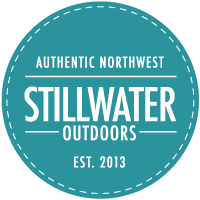No one plans to get hurt on a camping trip, but it happens. Knees get scraped, blisters form on feet, and how many of us remember to reapply sunscreen every 80 minutes? No matter how careful you are, injuries are bound to happen, which is why we have a few recommendations to help you prepare for those accidents and save your camping trip.
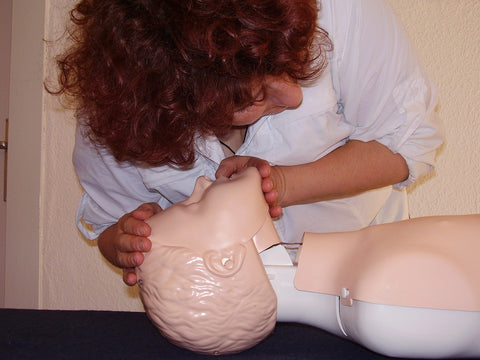
Take a First Aid Course
We know it seems like a hassle, especially with our schedules getting busier and busier, but it's always a good idea to have at least one person on the camping trip take a first aid course. Even better? Make it a family affair and have everyone sign up. Hopefully, you will never have to use any of the skills and know-how that you pick up during the course, but if something happens, you'll be glad that someone close knows exactly what to do.
The American Red Cross offers classes all across the nation. Visit their website to find a class near you. They also offer online courses on specific injury first aid like severe bleeding, dog and cat first aid, and basic first aid and CPR courses.
American Red Cross - First Aid Training
Buy a First Aid Kit
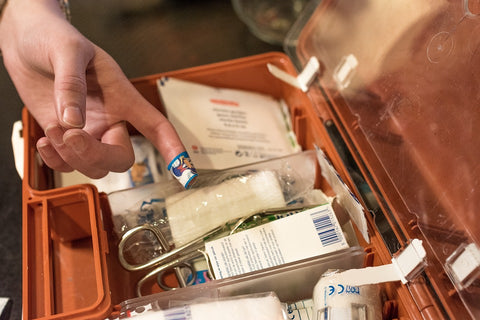
Did you remember the sleeping bags? The tent? The food you prepared ahead of time? What about the first aid kit? It's an easy item to forget, especially since it is (hopefully) used so little, but it's not something you want to be without. There are plenty of good kits available ranging in size and price, so selecting one can be a bit daunting, but even the most basic kit is a good place to start.
We recommend buying a plastic tote with latched handles to use as your first aid container. Why? Well, many kits have just enough room for the items they came with and some can be down-right impossible to repack after pulling out some supplies. The larger, clear tote allows you to add any additional items that you may require including things in larger amounts (like alcohol, iodine, and/or peroxide bottles).
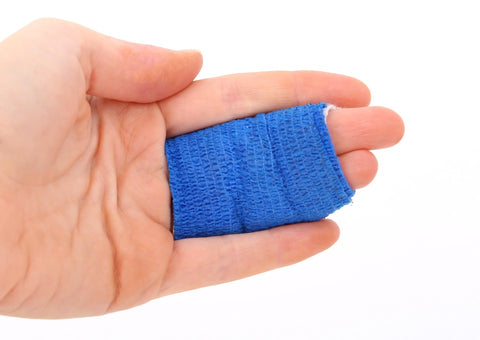
After you go through the kit, consider what you'll be doing, who will be participating, and where you will be going. What types of injuries are likely to happen? Will you be around open flames where burns could be possible? Is poison ivy, oak, or sumac native to the area? Do you have enough supplies to deal with multiple injuries?
If you plan to be exploring out away from your campsite via hiking, for example, consider making smaller, more compact, individual kits that each person can carry. This is especially true when space and weight is an issue during thru-hiking and other weight-sensitive activities. Make sure that these individual kits also include any of the person's required medicines in multiple day amounts (just in case they get lost or are injured and can't make it back to camp for a refill).
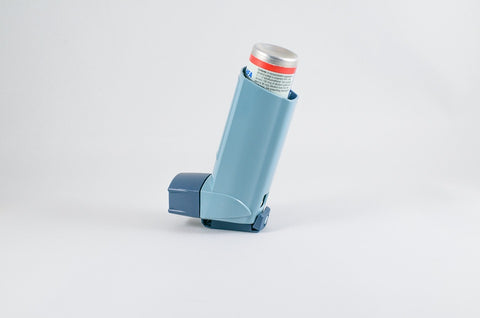
Remember, in the case of an emergency, call 911!
First Aid Supply List
This is by no means an exhaustive list and every item on here may not be necessary depending on what you plan to do or where you go, but hopefully this list will help give you a better idea of the kinds of items you may need to handle a camping injury. When in doubt, talk to your first aid trainer or your general practitioner to get a better idea of what should be included in your kit or how to use something properly.
Most of these items can be found at your local pharmacy or supermarket store.
Bandages
- Adhesive Bandages of various sizes
- Non-Stick Sterile Gauze Pads of various sizes
- Wound Closure Strips (Butterfly Bandages)
- Triangular Bandage (for a sling)
- Medical Adhesive Tape
- Moleskin (blisters)
- Rolled Gauze
- Hemostatic Gauze (stop bleeding)
- Liquid Bandage
Creams/Ointments
- Antiseptic Wipes
- Antiseptic Hand Cleaner/Soap
- Antiseptic Solution (like peroxide)
- Calamine Lotion
- Hydrocortisone Cream
- Insect Bite Swaps/Ointment
- Sunscreen
- Sunburn Relief Gel
Tools
- Tweezers (small tipped for slivers)
- Paramedic Sheers (blunt-tipped)
- Thermometer
- 10cc Irrigation Syringe
- Small Flashlight and Batteries
- Splint (finger, SAM)
- Tick Removal Tool
- Safety Pins
- Cotton Tipped Swabs
- Scalpel with #12 or #15 blade
Medications
- Any Personal Medications
- Acetaminophen and/or Ibuprofin
- Lozenges (sore throats)
- Antihistamines
- Diarrhea Medication
- Antacid Tablets
- Aspirin (heart attack related)
- Oral Rehydration Salts
- Glucose (to treat hypoglycemia)
- Epinephrine Autoinjector
Other
- Disposable Ice Packs
- Disposable Non-Latex Gloves (several pairs)
- Medical Information for Individuals (list allergies, etc)
- Medical Waste Bags
- Sharps Box
- Emergency Heat-Reflecting Blanket
- Notepad (waterproof) with Pencil and/or Pen
